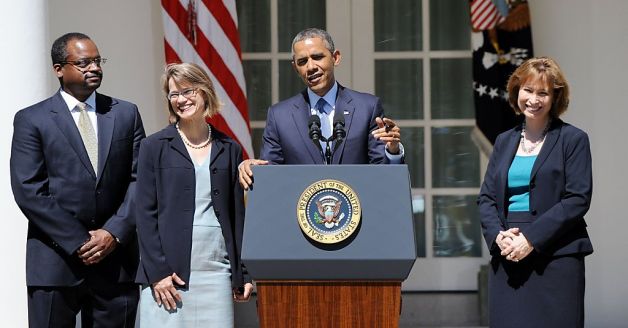
Nearly three weeks after Democrats triggered the “nuclear option” and altered filibuster rules to make it easier for sitting presidents to appoint federal judicial nominees, the Senate is set to vote on Patricia Ann Millett’s nomination to the United States Court of Appeals for the District of Columbia Circuit at 10 a.m. on Tuesday morning.
President Obama originally nominated Millett, who has argued 32 cases before the Supreme Court and currently co-heads the Supreme Court and national appellate practices at the Washington, D.C. law firm Akin Gump Strauss Hauer & Feld LLP, to a seat on the D.C. Circuit in June 2013. Senate Republicans deemed Millett too partisan and filibustered her nomination in October, which blocked her from receiving a confirmation vote before the full Senate.
Under the previous rule, Senate Democrats would have needed a sixty-person supermajority to overcome the minority party’s filibuster and force a confirmation vote—a number that they fell short of, with Republicans holding forty-five out of 100 seats. After the Republicans used the same tactic this fall to block two more D.C. Circuit nominees, however—Georgetown law professor Cornelia “Nina” Pillard and United States District Court Judge Robert Leon Wilkins—Democrats changed the rule outright so that only a simple majority would be required to obtain a confirmation vote. With the math on the Democrats’ side now, Millett is expected to be confirmed today. No date has been set yet for voting on Pillard and Wilkins.
The D.C. Circuit is widely referred to as the second most important court in the country after the Supreme Court, as it hears a disproportionate number of high-profile, high-impact regulatory and administrative cases compared to the other twelve federal circuit courts. In a paper published by the Cornell Journal of Law and Public Policy last week, four former D.C. Circuit law clerks examined the jurisdiction of the court and further noted that Congress often “carve[s] out certain areas of federal law as the special preserve of the D.C. Circuit,” which, when combined with the Supreme Court’s tendency to review only a small number of cases each term, effectively gives the D.C. Circuit “the final say—and the only appellate say—over numerous laws and rules affecting the entire nation.” The article’s authors found 150 statutory provisions in the United States Code that referred specifically to the D.C. Circuit, as opposed to eighty-eight mentions for the rest of the circuit courts combined.
In addition, the Circuit has become a stepping stone of sorts for judges aspiring to the highest bench of all: four out of the nine sitting Supreme Court justices have previously served on the D.C. Circuit. ((They are Chief Justice John G. Roberts, Jr. (2003-2005) and Justices Ruth Bader Ginsburg (1980-1993), Antonin Scalia (1982-1986) and Clarence Thomas (1990-1991).))
Of the eleven seats on the D.C. Circuit, four are currently filled by Republican-appointed judges and four by Democratic appointees, while three seats remain vacant. Because of this numerical tie, any changes that President Obama makes to its membership is seen as tipping the court’s balance toward his side of the political spectrum. Senate Republicans have tried to pre-empt this by proposing legislation earlier this year that would have eliminated the three vacancies on the circuit entirely, arguing that the court does not need eleven judges because it faces a lower caseload than it has in past years (and accusing Obama of “packing” the court by filling the empty seats). Given last month’s changes to the filibuster rule, however, this bill is likely to become moot as Democrats now push forward with confirming the President’s nominees.
The vote on Patricia Millett was originally scheduled for Monday evening but was postponed after bad weather in D.C. delayed the travel plans of some Senators.
